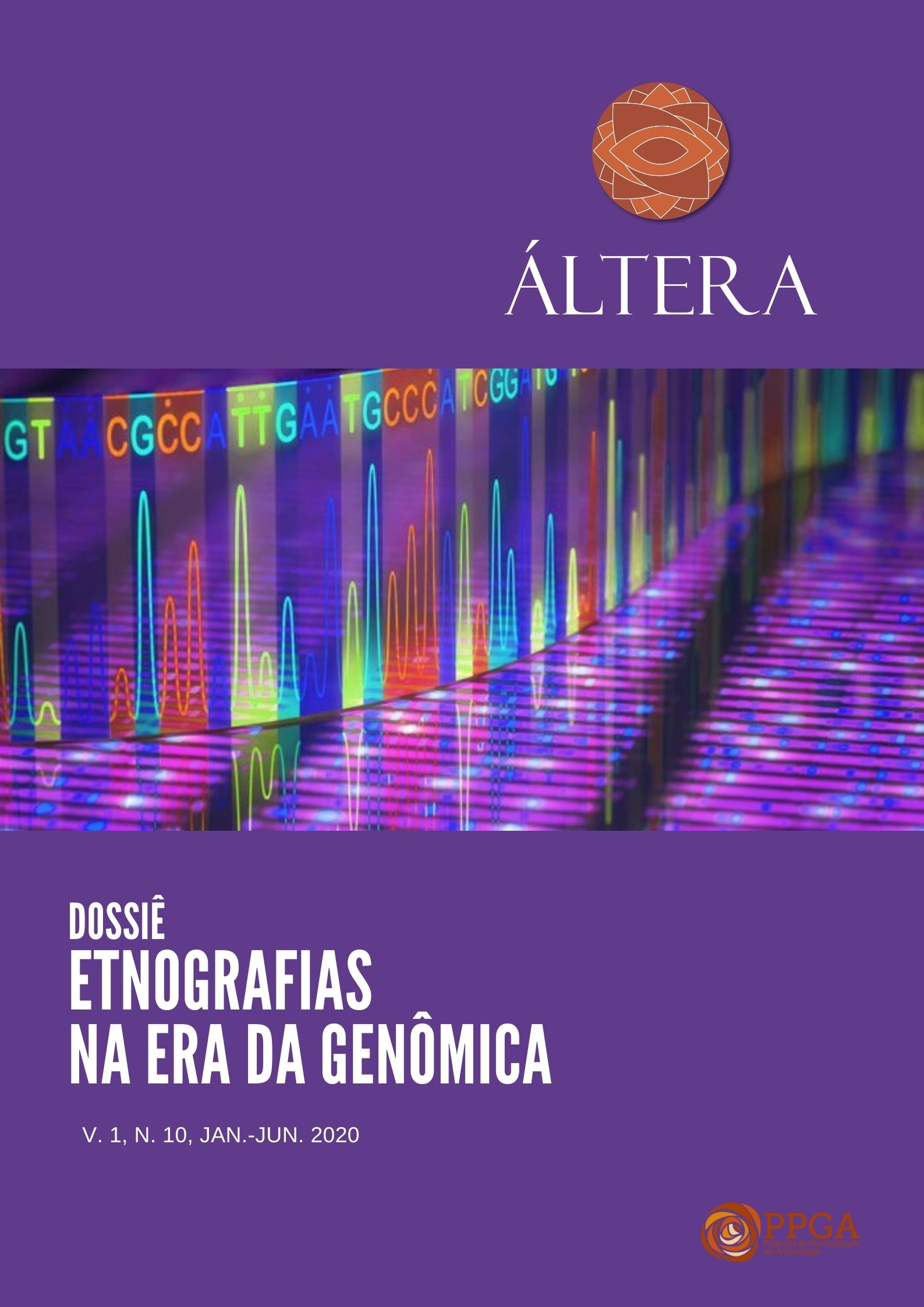“We are all mutants”
technogenesis and the coproduction of CRISPR/Cas9 in the United Kingdon
DOI:
https://doi.org/10.22478/ufpb.2447-9837.2020v1n10.44502Abstract
The gene editing emerges worldwide as a revolutionary technique for avoidable diseases and cure. Acting directly on humans, but also on the environment that surrounds them, fuels the hope of improving the health of current and future generations. Combining an approach on the mediations that create the social reality of these techniques and on the technoscientific practices that modify the possible bodies and worlds that it can inhabit, the article is dedicated to the description and analysis of the construction of CRISPR/Cas9 in the United Kingdom, pointing to the reconfiguration of the concept of nature from its clinical, commercial and ontological use, of interest for the present and the future of mutant humans.
Downloads
References
ALMEIDA, M. W. Barbosa. Metamorfoses e Fronteiras do natural e do humano. Semana de Ciências Sociais. Mesa-redonda “As Fronteiras entre as Ciências Naturais e as Ciências Sociais”. Instituto de Filosofia e Ciências Humanas, Universidade Estadual de Campinas, Campinas, 2012. Disponível em: https://mwba.files.wordpress.com/2012/11/almeida-2012-transformac3a7c3b5es-atravc3a9s-de-fronteiras-conferencia1.pdf Acesso: 10 Jan. 2019.
BUBELA, Tania. M.; CAULFIELD, Timothy. Do the Print Media “Hype” Genetic Research? A Comparison of Newspaper Stories and Peer-reviewed Research, CMAJ, v. 170, n. 9, p. 1399–1407, 2004. Available at: http://www.cmaj.ca/content/170/9/1399 Access 10th Jan. 2019.
CAVALIERI, Giulia. Genome editing and assisted reproduction: curing embryos, society or prospective parents?. Medicine, Health Care and Philosophy, v. 21, n. 2, p. 215-225, 2017. Available at: https://link.springer.com/article/10.1007/s11019-017-9793-y Access: 10th Jan. 2019.
DAVIS-FLOYD, Robbie and Joseph DUMIT (Org.). Cyborg Babies – From Techno-sex to Techno-Tots. New York: Routledge, 1998.
DUFRESNE, Jaques. Après l’homme... le cyborg?. Quebec: Editions Multimondes, 1999.
FAGOT-LARGEAULT, Anne. A Introdução na medicina de técnicas oriundas da genética ocasionou uma ruptura antropológica?. Scientiae Studia, São Paulo, v. 2, n. 2, p. 161-177, 2004.
GAD, Christopher; JENSEN, Casper Bruun; WINTHEREIK, Brit Ross. Practical Ontology – Worlds in STS and Anthropology. NatureCulture, p. 67-86, 2015.
GIBBON, Sahra. Breast Cancer Genes and the Gendering of Knowledge. Science and Citizenship in the Cultural Context of ‘New’ Genetics. New York: Palgrave MacMillan, 2007, 221p.
HABERMAS, Jüngen. O Futuro da Natureza Humana. São Paulo: Martins Fontes, 2003.
HAWKES, Nigel. UK scientists reject call for moratorium on gene editing. British Medical Journal, v. 350, n. h2601, 2015. Available at: https://www.bmj.com/content/350/bmj.h2601.full Access 4th jan. 2019.
HOQUET, Thierry. Adieu les monstres, vivent les mutants. Revue Critique, Tome LXII, n. 709-710, p. 479-481, 2006.
JASANOFF, Sheila (Ed.). The Idiom of Co-Production. In: States of Knowledge: The Co-Production of Science and Social Order. London: Routledge, p. 1-12, 2004.
KELLY, John D. The ontological turn in French philosophical anthropology. Hau: Journal of Ethnographic Theory. v. 4, n. 1, p. 259–269, 2014.
MOL, Annemarie. The Body Multiple – Ontology in Medical Practice. Durham and London: Duke University Press. 2002.
_________. Ontological Politics. A word and some questions. In: LAW, John e HASSARD, John (Org.). Actor Network Theory and After. Blackwell/The Sociological Review, 1999.
PRECIADO, Beatriz. Testo Yonki. Madrid: Espasa, 2008.
RABINOW, Paul; BENNET, Gaymon. Designing Human Practices – An Experiment with Synthetic Biology. Chicago: University Chicago Press, 2012, 203p.
ROSE, Nikolas. The Politics of Life Itself. Theory, Culture & Society, SAGE, London, Thousand Oaks and New Delhi, v. 18, n. 6, p. 1–30, 2001.
ROHDEN, Fabíola. Vida Saudável versus Vida Aprimorada: tecnologias biomédicas, processos de subjetivação e aprimoramento. Horizontes Antropológicos, Porto Alegre, ano 23, n. 47, p. 29-60, jan./abr. 2017. Available at: http://dx.doi.org/10.1590/s0104-71832017000100002 Access: 10th Jan. 2019.
TAVARES, Fátima. Rediscutindo Conceitos na Antropologia da Saúde: notas sobre os agenciamentos terapêuticos. Mana, n. 23, v. 1, p. 201-228, 2017.
THOMPSON, Charis. Making Parents: the Ontological Choreography of Reproductive Technologies. Cambridge, Massachusetts: MIT Press, 2005.
TIBON-CORNILLOT, Michel. Les Corps Transfigurés – Mécanisation du vivant et imaginaire de la biologie. Paris: Ed. Du Seuil, 1992.
WEINER, Norbert. The Human use of Human Beings: Cybernetics and Society. Houghton Mifflin, 1954.
WERNER, Eric. The Coming CRISPR Wars: Or why genome editing can be more dangerous than nuclear weapons, Preprint, 2019. Available at: DOI: 10.13140/RG.2.2.17533.00485 Access 9th Jan. 2019.
WOESE, Carl W. A New Biology for a New Century. Microbiology and Molecular Biology Reviews. v. 68, n. 2, p. 173–186, June 2004.
YAMAMOTO, Takashi. Target Genome Editing Using Site-Specific Nucleases – ZFNs, TALENs and CRISPR/Cas9 System. Hiroshima: Springer, 2015, 205p.
Downloads
Published
Issue
Section
License
- Autores mantém os direitos autorais e concedem à revista o direito de primeira publicação, com o trabalho simultaneamente licenciado sob a Licença Creative Commons Attribution que permite o compartilhamento do trabalho com reconhecimento da autoria e publicação inicial nesta revista.
- Autores têm autorização para assumir contratos adicionais separadamente, para distribuição não-exclusiva da versão do trabalho publicada nesta revista (ex.: publicar em repositório institucional ou como capítulo de livro), com reconhecimento de autoria e publicação inicial nesta revista.
- Autores têm permissão e são estimulados a publicar e distribuir seu trabalho online (ex.: em repositórios institucionais ou na sua página pessoal) a qualquer ponto antes ou durante o processo editorial, já que isso pode gerar alterações produtivas, bem como aumentar o impacto e a citação do trabalho publicado (Veja O Efeito do Acesso Livre).



